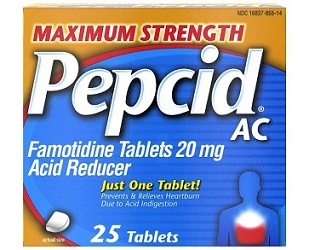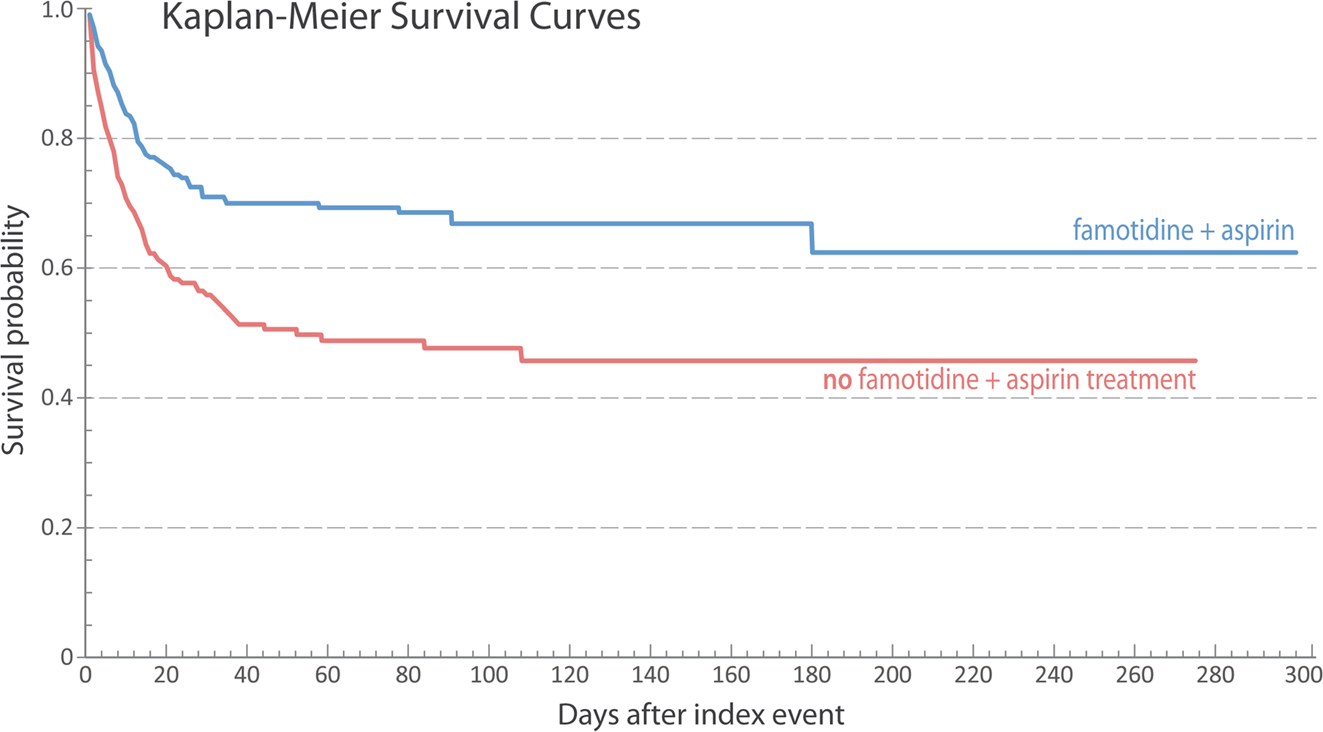BREAKING! American and German Study Shows That Heartburn Drug Famotidine With Aspirin Prevents COVID-19 Disease Severity and Mortality
Source: COVID-19 Drugs Aug 21, 2021 4 years, 5 months, 1 week, 5 days, 2 hours, 46 minutes ago
COVID-19 Drugs: A detailed meta-analytical study by researchers from the University of Virginia-USA, Humboldt-Universität zu Berlin-Germany, Freie Universität-Germany and Berlin Institute of Health, of previous research findings including clinical trials has revealed that the heartburn drug famotidine used alongside Aspirin has the potential to prevent disease severity and mortality in those infected with the COVID-19 disease.

The study showed real-world evidence for improved outcomes with Histamine H2 receptor antagonists (H2RAs) such as famotidine and aspirin in more than 22,560 COVID-19 patients.
A dense web of functional linkages exists between histamine and H2RAs, on the one hand, and disparate physiological pathways on the other hand. These downstream signaling pathways include gastrointestinal systems (acid reduction) as well as the dysregulated inflammatory cascades (cytokine storm) that likely underlie much of the pathophysiology of COVID-19.The mechanistic basis of a putative role of famotidine in COVID-19 likely involves its roles as an H2RA versus, for instance, direct binding to the viral protease 3CLpro (and resultant inhibition), as had been originally suspected from molecular docking studies.
The study team says that famotidine is useful in treating COVID-19 because of the capacity of H2RAs to attenuate the pro-inflammatory pathways that become dysregulated upon infection (cytokine storms activate pro-fibrotic pathways; lung damage eventually results). Thus, a role for famotidine in COVID-19 may stem from cellular mechanisms and signaling pathways quite unrelated to its classic therapeutic role in gastroenterology that, in turn, is an important lesson as regards drug repurposing (from a systems pharmacology perspective), targeted therapeutics, and the general idea of a COVID-19 ‘disease map’.
The study findings were published as a correspondence in the peer reviewed journal: Signal Transduction & Targeted Therapy (from the Nature publishing group).
https://www.nature.com/articles/s41392-021-00689-y
Thailand Medical News had been reporting about the potential use of famotidine to treat COVID-19 since May 2020.
https://www.thailandmedical.news/news/covid-19-drugs-study-shows-common-and-cheap-heartburn-drug-famotidine-improves-outcomes-of-hospitalized-covid-19-patients
https://www.thailandmedical.news/news/breaking-studies-show-famotidine,-a-common-indigestion-drug-could-help-in-mild-to-moderate-cases-of-covid-19
https://www.thailandmedical.news/news/breaking-covid-19-treatments-second-observational-study-shows-famotidine-associated-with-better-outcomes-for-hospitalized-covid-19-patients
//www.thailandmedical.news/news/covid-19-treatments-study-shows-using-dual-antihistamines-such-as-cetirizine-and-famotidine-helps-pulmonary-symptoms-in-covid-19-patients">https://www.thailandmedical.news/news/covid-19-treatments-study-shows-using-dual-antihistamines-such-as-cetirizine-and-famotidine-helps-pulmonary-symptoms-in-covid-19-patients
During the initial phase of the COVID-19 outbreak, physicians in Wuhan-China noticed something interesting. Many of the older patients who survived the virus were poor: not exactly the demographic you would expect to fare well in a health crisis.
A detailed analysis of the survivors' medical records revealed that a significant number suffered from chronic heartburn and were taking an inexpensive drug called famotidine, the key ingredient in Pepcid.
https://www.sciencemag.org/news/2020/04/new-york-clinical-trial-quietly-tests-heartburn-remedy-against-coronavirus
However wealthier patients tended to take the more costly drug omeprazole, found in Prilosec. (It should be noted that PPIs used to treat heartburn can cause worse outcomes in those with COVID-19)
https://www.thailandmedical.news/news/u-s-study-shows-that-users-of-proton-pump-inhibitors-or-ppis-have-higher-mortality-risk-when-infected-with-covid-19
The question started to linger in the minds of researchers then as to whether an over-the-counter acid suppressant could help people survive COVID-19.
According to biomedical engineering professor Dr Phil Bourne, who serves as founding dean for the School of Data Science at the University of Virginia, “This is how many medical studies begin.”
He told Thailand Medical News, "There's often a phenomenon that doctors report anecdotally, or that's mentioned in passing in a particular research paper, and that provides a clue or a hook.”
Normally, to find out whether a drug is effective in treating a particular medical condition, scientists develop prospective clinical trials. But this method is expensive and can take years, Dr Bourne pointed out. When faced with a global pandemic, it's helpful to explore other options.
Importantly that's where data scientists come in. Dr Bourne and UVA senior scientist Dr Cameron Mura worked with an international team of researchers to analyze information from a database that holds the medical records of millions of COVID-19 patients living in 30 different countries.
The study team narrowed that number down to around 22,000 people, the largest sample size for a study on
famotidine and the disease to date.
Dr Bourne commented, "The power of the electronic health record, which is really yet to be fully realized as a research tool, is that you've suddenly got all this data you can mine to see whether what you determined in passing or anecdotally has any basis.”
The study team's analysis showed that the data supported findings from other smaller-scale studies.
When delivered at high doses (the equivalent of about 10 Pepcid tablets), famotidine appears to improve the odds of survival for COVID-19 patients, especially when it is combined with aspirin. It also seems to hinder the severity of disease progression, making patients less likely to reach the point where they require intubation or a ventilator.
 Kaplan–Meier survival curves are shown for COVID-19 patients with (blue) or without (red) the dual combination treatment of famotidine and aspirin; the time-evolution of survival probabilities is given in terms of number of days after the index event (a positive COVID-19 diagnosis)
Kaplan–Meier survival curves are shown for COVID-19 patients with (blue) or without (red) the dual combination treatment of famotidine and aspirin; the time-evolution of survival probabilities is given in terms of number of days after the index event (a positive COVID-19 diagnosis)
Logically the next challenge was to figure out why. Data scientists like Dr Mura and Dr Bourne perform extensive detective work for medical analyses like this one, looking at existing information and drawing upon biochemical and molecular principles to propose a cohesive theory that helps elucidate the population-scale patterns they identify.
Dr Mura calls this "weaving a story" based on the data. He needed to work backwards from massive groups of people and draw some possible conclusions about what was happening at a totally different scale—the scale of proteins that are "one millionth the size of an ant.”
It is already known that one of the most dangerous phenomena COVID-19 can trigger in your body is something called a cytokine storm, which is a potentially fatal amplification of an immune response. When you become sick, your immune system releases inflammatory proteins called cytokines that tell your immune cells how to fight the infection. But in more severe illnesses, cytokine production can spiral out of control, becoming dysregulated.
Dr Mura added, "Basically, your immune system goes haywire and starts attacking things like your otherwise healthy lung tissue because it's so desperate to kill off the invading virus. Your own physiology essentially uses a sledgehammer against the pathogen when a fly swatter would suffice."
The study team's theory is that famotidine suppresses that reaction. Although it was developed with a specific purpose in mind ie blocking the histamine receptors that help produce acid in your stomach, famotidine, like all other medications, can cause side effects. Dr Mura and his colleagues believe that interfering with cytokine storms might be one of them.
Dr Mura further added, "It may well be a case of famotidine having a beneficial off-target effect. We generally think of side effects as a bad thing, but in some cases, they can be harnessed to treat other conditions. In the future, it's possible that famotidine could be re-purposed in this way.”
However the study team's findings are far from conclusive. Other studies have offered conflicting pictures of what famotidine can do for COVID-19 patients.
Some have found that it has a neutral effect and one has even suggested that it might be detrimental. Dr Mura, Dr Bourne and their colleagues recently published a review of existing research on the subject, along with suggestions for a framework that could help reconcile the contradictory reports.
However, with its unique focus on combining famotidine with aspirin and its impressively large sample size, the team's study has shed further light on an inexpensive and safe potential treatment that would be easy for doctors to prescribe. In the midst of an international health crisis, the study has also laid important groundwork for further research.
Dr Mura stressed, "Scientific studies are sometimes viewed as the end-all, be-all, but they're really just a starting point or a springboard. Any good study raises more questions than it answers, and data science is often what kick-starts that process."
The study team concluded, “Given the findings reported here, alongside the cost-effectiveness and mild side-effects of OTC drugs like famotidine and aspirin, we suggest that further prospective clinical trials perhaps utilizing the aspirin combination reported here are advisable.
Currently three randomized, controlled clinical trials are underway (NCT04504240, NCT04370262, and NCT04545008) that will help illuminate famotidine’s potential therapeutic profile.
Thailand Medical News warns all readers to not attempt to self-prescribe or self-treat with any of the therapeutic protocols discussed here as they are merely research reports. Always consult a licensed medical doctor before attempting to consume any repurposed drugs, supplements or even herbs to treat COVID-19. (Provided they know anything!)
Please help by donating to support this website and also all our research and community initiatives. Thank You. https://www.thailandmedical.news/p/sponsorship
For the latest on
COVID-19 Drugs, keep on logging to Thailand Medical News.
Read Also:
https://www.thailandmedical.news/news/american-study-confirms-that-aspirin-use-is-associated-with-decreased-mortality-risk-in-covid-19-patients
https://www.thailandmedical.news/news/american-study-shows-that-taking-low-dose-aspirin-decreases-risk-of-severity-and-mortality-when-infected-with-covid-19
https://www.thailandmedical.news/news/breaking-university-of-maryland-study-shows-that-aspirin-use-reduces-risk-of-both-mortality-and-mechanical-ventilation-in-hospitalized-covid-19-patien

